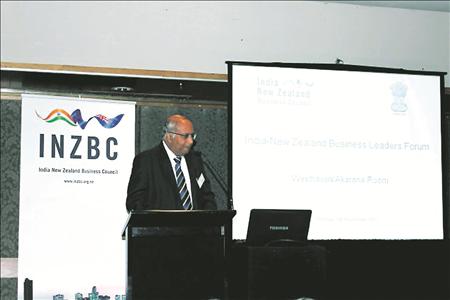 While New Zealand and Indian bureaucrats are busy addressing some of the imponderables challenging the progress of a Free Trade Agreement (FTA), officials of the Wellington based Indian High Commission (and the India New Zealand Business Council- INZBC (Auckland, Wellington and Christchurch) have been discussing ways and means of lifting bilateral relations.
While New Zealand and Indian bureaucrats are busy addressing some of the imponderables challenging the progress of a Free Trade Agreement (FTA), officials of the Wellington based Indian High Commission (and the India New Zealand Business Council- INZBC (Auckland, Wellington and Christchurch) have been discussing ways and means of lifting bilateral relations.
FTAs invariably envisage the tough and often frustrating process of negotiation, striking common ground, avoiding clash of interests and reaching a settlement that is not only long-standing but also beneficial to a majority of the people in the concerned countries.
Export of agricultural and dairy products, trade barriers including high tariffs and other impeding factors are issues that the two governments must address to reach the final stage of negotiations. While New Zealand has shown flexibility on the nuclear front and supporting India’s candidature for Permanent Membership to the UN Security Council, New Delhi must demonstrate its goodwill by helping to achieve consensus on key imports from New Zealand.
While the Government-to-Government talks go on, the evidence of goodwill and understanding at the Government-to-private, sector level surfaced at a business forum held at Langham Hotel in Auckland on November 14.
Chief Executive and senior managers of a number of local businesses, owned and managed by a mix of New Zealanders of Indian and European origin outlined their programmes and plans of action for a more effective and constructive engagement with their counterparts in India.
‘Historic’ event
The Indian High Commission and the INZBC were the joint organisers of the Programme, which witnessed exchange of significant information.
INZBC Chairman Wenceslaus Anthony described the event as ‘historic,’ stating that it marked a first for the Indian High Commission to co-sponsor a programme.
“The credit for bringing together the Mission and the Council to create a common platform for discussion and dissemination of information between New Zealand and Indian businesses belongs to Mr Mehta. His achievements over a short span of two years were significant and far-reaching,” he said.
According to Mr Antony, the State Visit of Prime Minister John Key to India in June was the most significant in the history of Indo-Kiwi bilateral relations and that it had opened fresh avenues for cooperation and coordination between businesses in the two countries.
Sharing information
“We must jointly explore emerging opportunities and meet the challenges ahead. We must also encourage Indian businesses to invest in New Zealand, by providing them with relevant information, business practices, rules and regulations and available incentives. Our engagement should be constructive and meaningful,” he said.
New Zealand should not miss the opportunities that India presents for enhancing mutually beneficial relationship and tap into the immense investment and commercial business potential, a senior Indian diplomat has said.
“With its business friendly environment, market reforms, huge market and growing middle class with high levels of disposal income, India has become the flavour of the world,” India’s High Commissioner to New Zealand Admiral Sureesh Mehta said.
India leads
He said the Indian and New Zealand Governments were keen to conclude a successful Free Trade Agreement as soon as possible and that such an Agreement will facilitate a larger volume of two-way trade and investment.
“However, there are several areas that offer possibilities for more intensive engagement. Education, investment and joint ventures are sectors that have immense potential to New Zealand businesses and investors,” he said.
“The annual flow of Foreign Direct Investment is $US 30 billion, with $US 200 billion worth of business potential for foreign companies. Almost all major international companies have established their presence in India. The ever- increasing domestic demand for goods and services, a strong services sector, high rate of consumption and high-end technology are among the drivers of growth,” he said.
According to Mr Mehta, the huge domestic market and the robust economy insulated India from suffering the adverse effects of the global financial crisis and the crippling recession.
“Today, India is the fourth largest economy in the world, accounting with GDP of $US 1.2 trillion and Purchasing Power Parity of $US 4.3 trillion. The Indian economy grew respectively by 6.5% and 9% in 2008 and 2009, with impressive levels of growth expected this year,” he said.
Other Speakers
Glidepath Chairman Sir Ken Stevens, Fonterra General Manager, External Relations Rick Osborne, eBus Chief Operating Office, Michael Orton and Patton Limited Chief Executive Sameer Handa were among the speakers at the Forum.
Among the services that INZBC provides to the business community include facilitation and assistance to visiting trade delegations, introducing local businesses and encouraging New Zealand companies to visit India.
Council Services
Mr Anthony said Export Promotion Councils operating under the auspices of various federal ministries in India were ideal avenues for establishing contacts with Indian business since each such Council focuses on a specific industry.
He cited the Sports Export Promotion Council, Leather Export Promotion Council and the Spices Board of India as examples of involvement for organising Buyer & Seller Meet and exhibitions.






